

Pro-British. George III's PMs (1763-82) Grenville (1763-65) Rockingham (1765-66) Chatham, Wm Pitt "the Elder" (1766-68) Grafton (1768-70) North (1770-82) Lord Hillsborough (1768-72) Lord Dartmouth (1772-75) George Germain (Ld Sackville) (1775-82) Thomas Hutchinson. MA (1769-74) Hutchinson's Boston mansion was ransacked in 1765 during protests against the Stamp Act, damaging his collection of materials on early Massachusetts history.
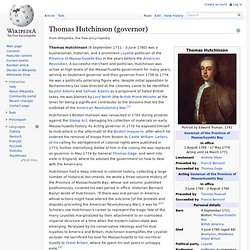
Francis Bernard. NJ (1758-60), MA (1760-69) Sir Francis Bernard, 1st Baronet (bapt. 12 July 1712 – 16 June 1779) was a British colonial administrator who served as governor of the provinces of New Jersey and Massachusetts Bay.
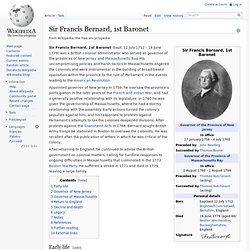
His uncompromising policies and harsh tactics in Massachusetts angered the colonists and were instrumental in the building of broad-based opposition within the province to the rule of Parliament in the events leading to the American Revolution. Appointed governor of New Jersey in 1758, he oversaw the province's participation in the later years of the French and Indian War, and had a generally positive relationship with its legislature.
In 1760 he was given the governorship of Massachusetts, where he had a stormy relationship with the assembly. Early actions turned the colony's populists against him, and his responses to protests against Parliament's attempts to tax the colonies deepened divisions. William Tryon. NC (1765-71), NY (1771-80) William Tryon (8 June 1729 – 27 January 1788) was a British soldier and colonial administrator who served as governor of the Province of North Carolina (1765–1771) and the Province of New York (1771–1780).
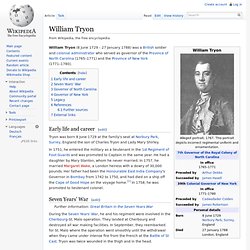
Early life and career[edit] Tryon was born 8 June 1729 at the family's seat at Norbury Park, Surrey, England the son of Charles Tryon and Lady Mary Shirley. Seven Years' War[edit] During the Seven Years' War, he and his regiment were involved in the Cherbourg-St. Malo operation. Thomas Dunmore. NY (1770-71), VA (1771-75)
Josiah Martin. NC (1771-75) Lieutenant-Colonel Josiah Martin (23 April 1737 – 13 April 1786) was the last Royal Governor of the Province of North Carolina (1771–1775).
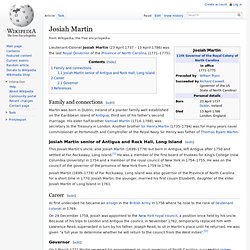
Family and connections[edit] Josiah Martin senior of Antigua and Rock Hall, Long Island[edit] This Josiah Martin's uncle, also Josiah Martin (1699–1778) but born in Antigua, left Antigua after 1750 and settled at Far Rockaway, Long Island.[1] He was a member of the first board of trustees for King's College (now Columbia University) in 1754 and a member of the royal council of New York in 1754–1755. William Franklin. NJ (1763-76) Following imprisonment during the war, in 1782 the younger Franklin went into exile in Britain.
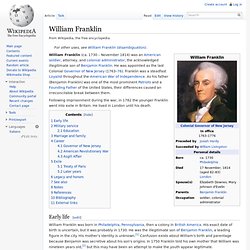
He lived in London until his death. Early life[edit] William Franklin was born in Philadelphia, Pennsylvania, then a colony in British America. His exact date of birth is uncertain, but it was probably in 1730. He was the illegitimate son of Benjamin Franklin, a leading figure in the city. William was raised by Benjamin Franklin and Deborah Read, his common-law wife; William always called her his mother.[2] There is some speculation that Deborah Read was William's mother, and that because of his parents' common-law relationship, the circumstances of his birth were obscured so as not to be politically harmful to him or to their marital arrangement. Military service[edit] Andrew Oliver. MA (1771-74) Massachusetts "agitators" Sam Adams. Samuel Adams. Samuel Adams (September 27 [O.S.
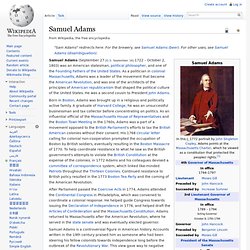
Joseph Warren. Joseph Warren. Warren had been commissioned a Major General in the colony's militia shortly before the June 17, 1775 Battle of Bunker Hill.
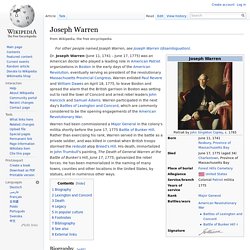
Rather than exercising his rank, Warren served in the battle as a private soldier, and was killed in combat when British troops stormed the redoubt atop Breed's Hill. His death, immortalized in John Trumbull's painting, The Death of General Warren at the Battle of Bunker's Hill, June 17, 1775, galvanized the rebel forces. He has been memorialized in the naming of many towns, counties and other locations in the United States, by statues, and in numerous other ways. Biography[edit] John Hancock. John Hancock. Hancock was one of Boston's leaders during the crisis that led to the outbreak of the American Revolutionary War in 1775.
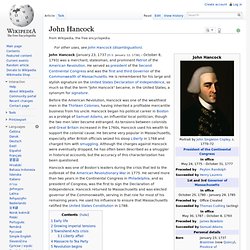
He served more than two years in the Continental Congress in Philadelphia, and as president of Congress, was the first to sign the Declaration of Independence. Hancock returned to Massachusetts and was elected governor of the Commonwealth, serving in that role for most of his remaining years. He used his influence to ensure that Massachusetts ratified the United States Constitution in 1788. Early life[edit] Edmund Burke. Edmund Burke. Burke was praised by both conservatives and liberals in the 19th century.[5] Since the 20th century, he has generally been viewed as the philosophical founder of modern conservatism.[6][7] Early life[edit] Burke was born in Dublin, Ireland, to a prosperous solicitor father (Richard; died 1761) of the Church of Ireland.
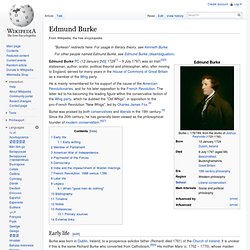
It is unclear if this is the same Richard Burke who converted from Catholicism.[8][9] His mother Mary (c. 1702 – 1770), whose maiden name was Nagle, was a Roman Catholic and came from an impoverished but genteel County Cork family. The Burke dynasty descended from an Anglo-Norman surnamed de Burgh (Latinised as de Burgo) who arrived in Ireland in 1185 following the Norman invasion of Ireland by Henry II of England in 1171.[10] Mr.
Arguments. William Pitt "the Elder" William Pitt, 1st Earl of Chatham. William Pitt, 1st Earl of Chatham PC (15 November 1708 – 11 May 1778).
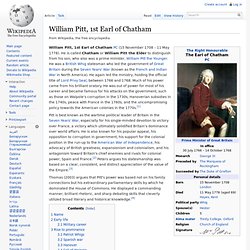
He is called Chatham or William Pitt the Elder to distinguish from his son, who also was a prime minister, William Pitt the Younger. John Wilkes. John Wilkes. This marked a turning point leading toward him embracing increasingly conservative policies which caused dissatisfaction among the progressive-radical low-to-middle income landowners. This was instrumental in the loss of his Middlesex parliamentary seat at the 1790 general election. At the age of 65, Wilkes retired from politics and took no part in progressive social reforms such as Catholic Emancipation in the 1790s following the French Revolution.
During his life, he earned a reputation as a libertine. Early life and character[edit] Arguments. Isaac Barré. Isaac Barré. Military career[edit] Born in Dublin, Ireland the son of a French Huguenot refugee, he was educated at Trinity College. While his parents had hoped he would study law, and although he had potential as an actor, Barré instead entered the British Army in 1746. Patrick Henry. Patrick Henry. Patrick Henry (May 29, 1736 – June 6, 1799) was an American attorney, planter and politician who became known as an orator during the movement for independence in Virginia in the 1770s. A Founding Father, he served as the first and sixth post-colonial Governor of Virginia, from 1776 to 1779 and from 1784 to 1786.
Henry led the opposition to the Stamp Act of 1765 and is remembered for his "Give me liberty, or give me death! " speech. Along with Samuel Adams and Thomas Paine, he is regarded as one of the most influential champions of Republicanism and an invested promoter of the American Revolution and its fight for independence. Give Me Liberty or Give Me Death - Montage. Benjamin Franklin. Benjamin Franklin FRS (January 17, 1706 [O.S. January 6, 1705][1] – April 17, 1790) was one of the Founding Fathers of the United States. A renowned polymath, Franklin was a leading author, printer, political theorist, politician, postmaster, scientist, inventor, civic activist, statesman, and diplomat. As a scientist, he was a major figure in the American Enlightenment and the history of physics for his discoveries and theories regarding electricity. As an inventor, he is known for the lightning rod, bifocals, and the Franklin stove, among other inventions.[2] He facilitated many civic organizations, including Philadelphia's fire department and a university.
Benjamin Franklin. James Otis. James Otis, Jr. James Otis, Jr. (February 5, 1725 – May 23, 1783) was a lawyer in colonial Massachusetts, a member of the Massachusetts provincial assembly, and an early advocate of the Patriot views against British policy that led to the American Revolution. His catchphrase "Taxation without representation is tyranny" became the basic Patriot position.[1] Early life[edit] Nicholas Cooke. RI 1775-76. Early life[edit] Jonathan Trumbull. CT 1769-1776, 1776-1784. Jonathan Trumbull, Sr. Historiography of the AWI. In the 200 years that historians have written about the American Revolution, four major arguments, or schools of thought, have emerged. Each of them presents a firm argument about what the Revolution really meant and how we should view it.
Which school of thought is right and which is wrong is ultimately for you to decide. Modern Historians Confront the AWI. [This article was originally published in Literature of Liberty.] I. Changing interpretations of the AWI. Social or Political causes?